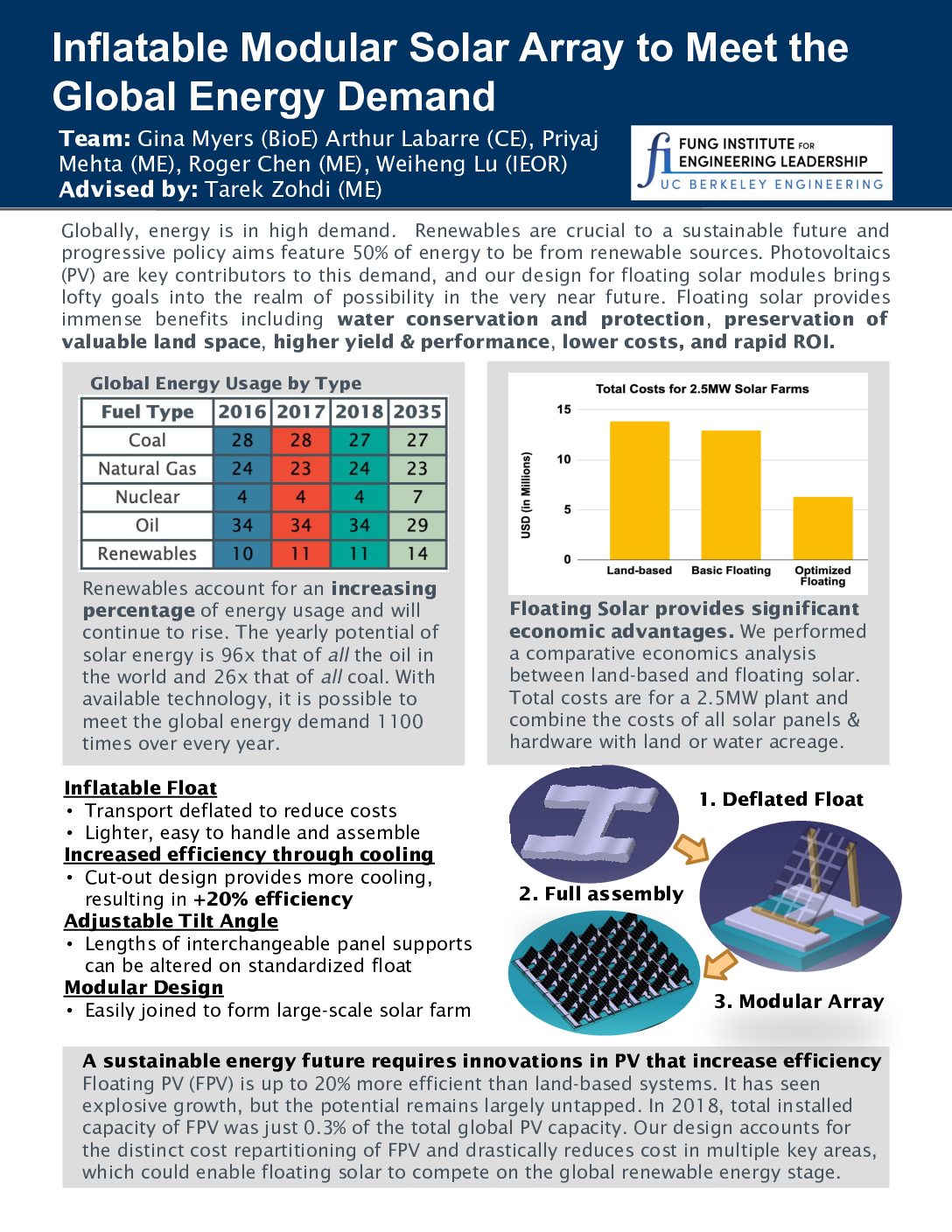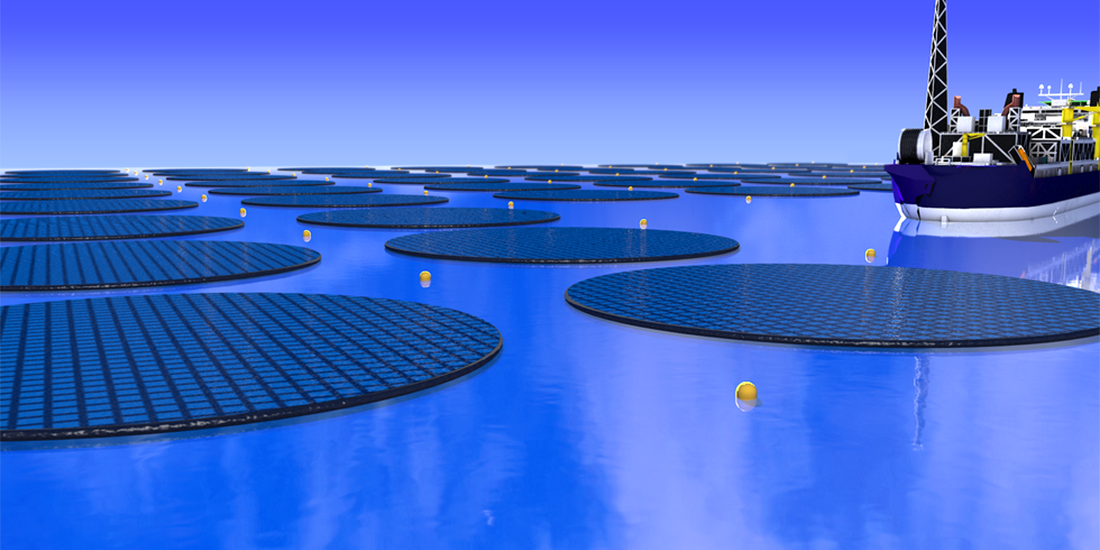
Team: Gina Myers (BIOE), Arthur Labarre (CEE), Weiheng (Jarvis) Lu (IEOR), Priyaj Mehta (ME), Ronggen Chen (ME)
Advisor: Tarek Zohdi (ME)
Improved photovoltaic technology is essential to meet growing global energy demands. Floating solar offers numerous advantages over land-based, including increased efficiency via cooling, reduced evaporation and algal growth, and the financial and ecological benefits of facile installation and protecting undeveloped land.
Our diverse team created a floating solar module for inland water bodies that is more energy and cost-efficient and easier to install than existing technologies. To accomplish this, our design incorporates an on-site inflatable floating structure, onto which the photovoltaic panels are mounted. This is a transformative innovation as it enables drastically lower transportation and installation costs.
Project Brief

Globally, energy is in high demand. Renewables are crucial to a sustainable future and progressive policy aims feature 50% of energy to be from renewable sources. Photovoltaics (PV) are key contributors to this demand, and our design for floating solar modules brings lofty goals into the realm of possibility in the very near future. Floating solar provides immense benefits including water conservation and protection, preservation of valuable land space, higher yield & performance, lower costs, and rapid ROI.
Renewables account for an increasing percentage of energy usage and will continue to rise. The yearly potential of solar energy is 96x that of all the oil in the world and 26x that of all coal. With available technology, it is possible to meet the global energy demand 1100 times over every year.
Floating Solar provides significant economic advantages. We performed a comparative economics analysis between land-based and floating solar. Total costs are for a 2.5MW plant and combine the costs of all solar panels & hardware with land or water acreage.
A sustainable energy future requires innovations in PV that increase efficiency Floating PV (FPV) is up to 20% more efficient than land-based systems. It has seen explosive growth, but the potential remains largely untapped. In 2018, total installed capacity of FPV was just 0.3% of the total global PV capacity. Our design accounts for the distinct cost repartitioning of FPV and drastically reduces cost in multiple key areas, which could enable floating solar to compete on the global renewable energy stage.
Original Article: Inflatable Modular Floating Solar Array to Meet the Global Energy Demand
More from: UC Berkeley College of Engineering
The Latest Updates from Bing News
Go deeper with Bing News on:
Floating PV
- Sungrow Celebrates Ten Years of Significant Milestones in the Indian Market
PRNewswire New Delhi [India] April 27 Sungrow a global leading PV inverter and energy storage system provider has marked a decade of operations in India achieving remarkable milestones in the country ...
- Green Energy Expo 2024: Sungrow Unveils its Innovative Solar-Plus-Storage Solutions to Facilitate South Korea's Energy Transition
Sungrow, the global leading PV inverter and energy storage system provider, showcased its cutting-edge solar-plus-storage solutions in the Green Energy Expo 2024. The solutions are designed to cater ...
- Sungrow Released Annual Report 2023: Operating Revenue Witnessed A Robust Growth of 79.5%
HEFEI, China, April 25, 2024 /CNW/ -- Sungrow, the global leading PV inverter and energy storage system provider, released its annual report 2023 recently. The company attained unprecedented revenues ...
- Sungrow Releases Annual Report 2023: Operating Revenue Witnessed a Robust Growth of 79.5%
Sungrow, the global leading PV inverter and energy storage system provider, released its annual report 2023 recently. The company attained unprecedented revenues and profits, fueled by robust demand ...
- Chemitek offers new cleaning products for floating PV
Chemitek Solar, a Portuguese manufacturer of cleaning solutions for the PV industry, said that two of its new products have passed ecotoxicity tests for their use on floating PV (FPV) plants. It ...
Go deeper with Bing News on:
Floating solar module
- Chinese Astronauts Performed Emergency Space Station Repairs Following Debris Impact
China's Tiangong space station partially lost power after its solar panels were struck by an unidentified object late last year.
- Chemitek offers new cleaning products for floating PV
It claimed that Solar Wash Protect (SWP) and Water Softening Agent (WSA) are both safe for vegetation and animals that live around floating plants. “The study reveals that the SWP only needs a column ...
- Trina Solar 210mm modules used in PV projects worldwide
A 31MW floating solar plant in Thailand deploying Trina Solar’s Vertex 670W modules was connected to the grid in early March. It is expected to cut CO2 emissions by 41,000 tons and provide an average ...
- US Solar Makers Seek Additional Tariffs on Panel Imports From Asia
Solar manufacturers are asking the US government to slap duties on $12.5 billion of imported panels from Southeast Asia, setting the stage for a sweeping trade probe that threatens to make power ...
- Chemitek solar panel cleaning agents confirmed as safe for use on floating PV
Cleaning solutions company Chemitek Solar has revealed the results of an ecotoxicity study on its Solar Wash Protect (SWP) and Water Softening Agent (WSA) ...









